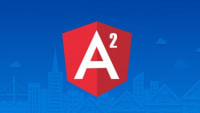Description
In this course, you will :
- Create Angular components to describe the features of your application.
- Compose Angular components and assign functions to interested parties.
- Encapsulate instance variables with Angular Component Controllers and make them available to templates.
- Create Service Classes to handle your application's business logic.
- Use internal Directives for things like property selectors and event handlers.
- To get the handle of DOM elements, use local variables in templates.
- Use Angular event syntax and the DOM event system to handle events.
- To debug issues, use the debugger in Chrome DevTools.
Syllabus :
1. TypeScript Crash-course
- Interfaces
- Classes: The Basics
- Classes: Adding a Constructor
- Classes: Inheritance
- Modules
2. Angular β
- Using Angular Project Files
- Using the Docs
- Concepts Overview
3. Components
- Intro to Components
- Basic Component Setup
- Basic Component Class
- Component Inputs
- Native DOM Property Binding
- Using Local Variables
- Component Outputs
4. Directives
- Attribute Directive
- Host Property
- NgIf
- NgFor
- NgClass
- NgStyle
- NgSwitch
5. Pipes
- Basic Custom Pipe
- Pipe with Parameters
- Using Pipe in Controller
- Date Pipe
- Slice Pipe
- Async Pipe
6. Services and Dependency Injection
- Simple Service
7. Http
- Using the Get method
8. Angular ɑ
- Disclaimer/Notes
- Using the Project Files
- Cloning the course repository
- Creating the root component
- Creating the main method
- Organize folders using a component-centric perspective
- Creating the Messenger Component
- Using the For directive
- Creating the Compose Component
- Creating the MessageStore Service
- Handling Events Example
- Composing Messenger with the Compose Component
- Debugging the Components









